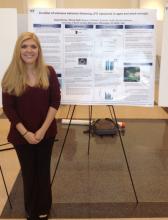My experince in Dr. Kohman's lab has been wonderful for over two years now. When I was first accepted I knew so little about what was being conducted in lab that I was concerned I would not be an asset. At the time I could not even understand a research article. However, being the patient mentor that she is, Dr. Kohman allowed me to understand that mistakes are okay and they ARE going to happen in a lab. However, she never made me feel bad about them. Anytime I didn't understand something I would ask ahead of time (even if it was the 10th time) to avoid making a mistake. When I did make one, she would explain to me why what I did was wrong and how we could fix it to be better equipped for the next time. I can honestly say it is because of her kind-hearted nature that I was able to blossom into a student who is conducting her own research from one who could not even read a research article when I first began.
Fall semester of my sophomore year I decided to switch to a Psychology major. Knowing that I was really intersted in the immune system and recovery, I sought out a professor who was working in this field. It just so happens that Dr. Kohman was the professor who was conducting research closest to what I wanted to do for a career. Once I figured this out, I persisted until I received an interview and, finally, my admission into the lab. I am hoping to gain the knowledge and experience needed to continue on to receive my Master's and PhD degrees.
From this experience I have learned the value of hard work. I cannot begin to count the amount of hours I have poured into my thesis. One of the most challenging aspects has been time management and balance. I am one of only a few people I know working on an honors thesis, so many of my friends have more time to spend with each other our last year here than I do. Looking back, had I known I was going to be taking a year off before applying to graduate school, I would have spent my summer preparing a lot more for my literature review which would have made my fall and winter break a lot less stressful.
Working in a lab for over two years has taught me the value of teamwork, as well as what it means to work independently, to be flexible, that you are never too great for any task given, and honesty. In a lab there can be a thousand experiments being conducted at the same time. Some days you may be the one conducting the behavioral testing, others you may be the one running subjects back and forth for someone else; however, neither of these tasks are more meaningful than the other. Whether it is weighing mice, cleaning the floors in lab, or cleaning glassware, no task is too small. Without everyone pitching in, it could not all get done and we would not be able to meet protocol requirements. Additionally, I have learned how important being able to work independently is. Because there are a large number of people in the lab at any given time, if we all had questions and could never do anything on our own, we would never get anything done. When conducting experiments involving multiple research assistants, there will be problems. However, it is up to everyone involved to remain flexible; people will get sick and subjects might not participate as planned; however, we still have to carry on. Lastly, I have learned the value of honesty in a lab. Once you have been properly trained on a task, for the most part you will be working independently on it. With that comes the oppprtunity to cut corners, or when something goes wrong to cover it up. However, this will only hurt the entire experiment, your PI, and your reputation. It is extremely important to remain 100% honest with your peers, research tech, and PI, or you will have lost their trust. I feel as though all of these values are viable when seeking employment or becoming a candidate for graduate school.





